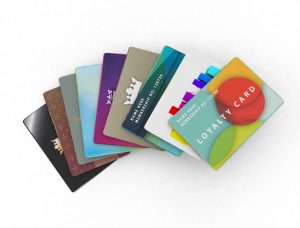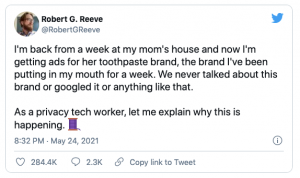How do you really feel about data privacy?
By Angela Gao | May 28, 2021
Thankfully no, large corporations are not spying on your family members to find out what toothpaste they use so they can recommend it to you the next time you open up your favorite social media apps. However, what they and data brokers do have access to is all of your purchases, browsing history, in-app activity, and any other data we willingly give up the instant we check off an application’s terms of service. This seemingly innocuous information can be used to make pretty accurate estimations of your preferences and create product recommendations based on a constructed user profile. This doesn’t stay isolated either. These profiles can draw in the preferences of other users similar to you or likely to be in your circle. While you as an individual may not share very much information, at such a large scale and as a collective, this data can hold great power in directing customer behavior. All these “free” social media applications really aren’t as free as we like to think they are.
The Market for Data
We know that our personal information is highly desirable, but how exactly can we evaluate the economic value of our data? High levels of competition gives firms large incentives to invest in gathering consumer data. A lack of privacy protection creates a stark imbalance of power between data subjects (users) and data holders (corporations).
Excess protection creates market inefficiencies by preventing normal transaction behavior. For example, limiting the input of personal information will obfuscate the purpose of social media applications that seek to connect users. However, the same can be said for a total lack of privacy. Both principles exemplify a fundamental economic principle that there exists some “optimal” level of protection. This notion comes with an assumption that consumers are informed, educated, and long-term utility maximizers. The reality is that most users are short-sighted. We are highly likely to still consent to secondary use of our data, especially as a prerequisite to access products or services. This imbalance lets sellers hoard all of the positive surplus or benefit from these data transactions.
The Intangibles
Our privacy decision making is confusing and often paradoxical. While we value privacy and demand its protection, we also easily give it away for small perks. Weak privacy assurances give us the greatest satisfaction, but strong assurances somehow end up being worse than not having any at all. Privacy violations with small losses make us worry, but we overlook intrusions with significant impact.
Classical rational choice theory argues that individuals would maximize utility over time, collect relevant information, have consistent preferences, and accurately assess probabilities (Bayesian updating). In practice, we are faced with incomplete and asymmetric information. Data subjects know very little in comparison to the data holders regarding the scale and use of collected personal data. The lack of data literacy among regular consumers also means a shallow understanding of the associated consequences. Our bounded rationality makes it difficult to digest the complexities of modern data pipelines in lieu of face value cost-benefits.
Trade-offs around privacy commonly exist as trade-offs between complex bundles of goods which can have ambiguous valuations. Privacy-related benefits are rarely monetary and the marginal value becomes difficult for an individual to evaluate with each layer of complexity. Many times, we may not even know what the possible outcomes of a privacy sensitive scenario may be. For online purchases, we reveal our credit card details which increases the risk of identity theft. When purchasing groceries, we may use a membership card for coupons and points, sharing our buying history and risking junk or targeted ads. Rarely do we stop to think about what information we are sharing and assess the privacy risks.

The field of behavioral economics has done lots of work in expanding upon many of the assumptions economic models make regarding consumer behavior by considering individual and social psychology. The interconnected effects from our bounded rationality, scenario framing, heuristics, and implicit biases all influence how we compare choices in our risk evaluation and time value discount. This is key in understanding our tendency to trade-off privacy costs and benefits in a way that is inconsistent and damaging to initial or long-term plans for immediate gratification.
References https://twitter.com/RobertGReeve/status/1397032784703655938 https://www.heinz.cmu.edu/~acquisti/papers/Acquisti-Grossklags-Chapter-Etrics.pdf
https://www.behavioraleconomics.com/rationality-disclosure-and-the-privacy-paradox/

